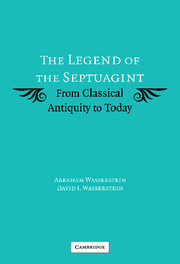Book contents
- Frontmatter
- Contents
- Preface and Acknowledgments
- Abbreviations
- Introduction
- 1 The Letter of Aristeas
- 2 The Hellenistic Jewish Tradition
- 3 The Rabbis and the Greek Bible
- 4 The Ptolemaic Changes
- 5 The Church Fathers and the Translation of the Septuagint
- 6 Among the Christians in the Orient
- 7 The Muslims and the Septuagint
- 8 Yosippon and the Story of the Seventy
- 9 Karaites, Samaritans and Rabbanite Jews in the Middle Ages
- 10 The Septuagint in the Renaissance and the Modern World
- Conclusion
- Appendix: In Partibus Infidelium: Zosimus of Panopolis
- Bibliography and Sources
- Index
Appendix: In Partibus Infidelium: Zosimus of Panopolis
Published online by Cambridge University Press: 17 July 2009
- Frontmatter
- Contents
- Preface and Acknowledgments
- Abbreviations
- Introduction
- 1 The Letter of Aristeas
- 2 The Hellenistic Jewish Tradition
- 3 The Rabbis and the Greek Bible
- 4 The Ptolemaic Changes
- 5 The Church Fathers and the Translation of the Septuagint
- 6 Among the Christians in the Orient
- 7 The Muslims and the Septuagint
- 8 Yosippon and the Story of the Seventy
- 9 Karaites, Samaritans and Rabbanite Jews in the Middle Ages
- 10 The Septuagint in the Renaissance and the Modern World
- Conclusion
- Appendix: In Partibus Infidelium: Zosimus of Panopolis
- Bibliography and Sources
- Index
Summary
Zosimus of Panopolis does not fit neatly into the schema which we have used to categorise the contents of this book. That schema divided our sources essentially according to religious context: Jewish, Christian and Muslim. Zosimus does not fit tidily into any of these categories. The Appendix is his natural home. Though Greek, apparently he is not Christian. Although he comes from and works in the East, in Egypt, he is too early to be placed in the broader category of the orient as I have used that term in this book. He is a pagan, of sorts, in a world which, if not yet fully, even dominantly, so, is by this time essentially Christian; he is Greek-writing – it would appear – but deep in Upper Egypt (Panopolis is situated far to the south of Asyut on the right bank of the Nile and, though it came to be a Christian centre of some cultural significance, that happened only a century or so after the most commonly assumed time of Zosimus). Though a Greek, finally, his use of the story appears to have egyptianising aims.
For a pagan and a polytheist, the story of the translation by the Seventy is likely to have had little real attraction, as it has most genuine significance in the exclusivist atmosphere of a monotheistic faith that regarded the Jewish scriptures as sacred. That explains why the story can be put to such effective polemical use in Christianity and, later, Islam.
- Type
- Chapter
- Information
- The Legend of the SeptuagintFrom Classical Antiquity to Today, pp. 275 - 290Publisher: Cambridge University PressPrint publication year: 2006



